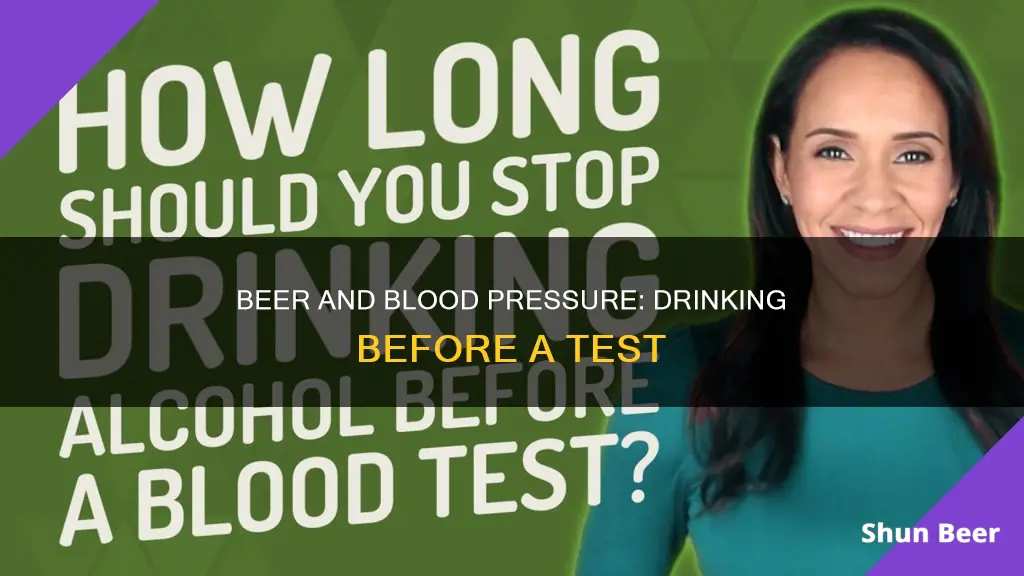
If you have a blood test scheduled, you may be wondering if it's okay to have a drink the night before. The answer depends on the type of blood test you're having and how much you plan to drink. Alcohol can affect blood sugar, cause irregular enzymes and fat levels, and lead to inaccurate blood test results. It can also disrupt the balance of glucose regulation in the body and impair the liver's ability to produce glucose, which may result in hypoglycemia. Generally, it's recommended to avoid alcohol before a blood test, especially if you need to fast. However, if you limit yourself to one or two drinks and start fasting 12 hours before the test, the alcohol will most likely be metabolized and shouldn't affect your results.
| Characteristics | Values |
|---|---|
| Alcohol before a blood test | Alcohol can stay in the bloodstream for up to 12 hours after consumption and can be traced in the bloodstream for several days. |
| Alcohol impact on blood test report | Alcohol consumption may cause irregular enzyme levels, which might interfere with a blood examination. |
| Alcohol impact on the body | Alcohol can disrupt the balance of glucose regulation in the body, impair the liver's ability to produce glucose and may lead to hypoglycemia. |
| Blood tests affected by alcohol consumption | Lipid panel blood test |
| Alcohol use biomarkers | Ethyl glucuronide (EtG), Carbohydrate-deficient transferrin (CDT), Phosphatidylethanol (PEth), Aspartate aminotransferase (AST), Alanine aminotransferase (ALT), Gamma-glutamyl transferase (GGT), Mean corpuscular volume (MCV) |
What You'll Learn

Alcohol can stay in the bloodstream for 12 hours
It is generally not advisable to consume alcohol before a blood test. This is because alcohol can stay in the bloodstream for up to 12 hours, and even longer in some cases.
Alcohol contains ethanol, a psychoactive substance that can impact mood, confidence, and socialisation skills. It is not digested but is absorbed straight into the bloodstream. Once in the bloodstream, alcohol is transported throughout the body and travels to the brain. It is predominantly broken down by the liver, which metabolises it at a rate of about one standard drink per hour. However, this can vary depending on factors such as genetics, the amount consumed, age, weight, and the amount of food consumed.
The presence of food in the stomach can slow the absorption of alcohol. Food can absorb alcohol, inhibit it from coming into contact with the stomach lining, or slow its transit to the small intestine, where it is rapidly absorbed into the bloodstream. Eating regular meals and snacks while drinking can help to slow the rate of absorption.
The amount of time alcohol stays in the body also depends on the type of test used. Alcohol detection tests can measure alcohol in the blood for up to 12 hours, but it can be detected in urine and breath for 12 to 24 hours. Alcohol can even be detected in hair follicles for up to 90 days after consumption.
Therefore, it is important to avoid consuming alcohol before a blood test to ensure accurate results.
Texas Beer Laws: Drinking and Driving Explained
You may want to see also

Doctors recommend fasting for 8-12 hours before a blood test
It is not advisable to drink beer the night before a blood pressure test. Alcohol can stay in the bloodstream for up to 12 hours, and even tiny amounts can be traced in the blood several days after consumption.
If you are having a fasting blood glucose test, a lipid profile, or a basic or comprehensive metabolic panel, you will need to fast for 8-12 hours. This is because these tests measure the levels of glucose, cholesterol, and other blood fats, as well as kidney and liver function.
It is important to note that not all blood tests require fasting. If you are unsure, it is always best to check with your doctor. They will be able to give you specific instructions based on the type of test you are having.
During a fast, you should avoid all food and drinks except water. This is because even juice, coffee, and soda can get into the bloodstream and affect the results. Chewing gum, smoking, and exercising are also off-limits, as they can skew the results.
If you forget and eat or drink something before your test, it is important to let the person taking your blood know. They may ask you to reschedule to ensure accurate results.
Beer and Crohn's: What's Safe to Drink?
You may want to see also

Alcohol can cause inaccurate blood test results
Alcohol contains ethanol, a psychoactive substance that affects mood, confidence, and socialisation skills. It can cause irregular enzyme levels, which may interfere with blood examination results. This is why doctors recommend fasting for at least 8-12 hours before a blood test, and this includes refraining from alcohol.
Alcohol can also impact blood sugar and fat levels, which are commonly tested in lab work such as a lipid panel or A1C test. Consuming alcohol the night before these types of tests can result in inaccurate readings.
In addition, alcohol blood tests are used to specifically measure the level of alcohol in the blood and can detect heavy drinking. These tests are often used for legal reasons, such as determining if someone was driving under the influence, or for medical or employment purposes. While blood alcohol tests are more accurate than breathalyzers, they still require several weeks to obtain results.
Therefore, it is important to refrain from consuming alcohol before a blood test to ensure accurate results. This includes avoiding alcohol the night before the test, as it can remain in the bloodstream and impact the readings.
Beer Consumption: Safe Daily Limit?
You may want to see also

A blood test can detect alcohol consumption up to 12 hours after drinking
If you have a blood test coming up, it's best to avoid drinking alcohol beforehand. Alcohol can affect your blood sugar and fat levels, which can interfere with common tests such as a lipid panel or A1C test. It can also cause irregular enzyme levels, which can impact the accuracy of the results.
A blood alcohol concentration (BAC) test can detect alcohol in your blood for up to 12 hours after drinking. This test can also show how much alcohol you consumed. Other blood tests can detect substances that may stay in your blood for weeks after drinking. These tests are typically used to check for alcohol use disorder (AUD) or to monitor sobriety in individuals recovering from AUD.
The time it takes for alcohol to leave your system depends on various factors, including your metabolism, body weight, genetics, age, overall health, medications, and the amount of food eaten that day. Generally, it takes up to 12 hours for alcohol to get out of your bloodstream, but even tiny amounts can be traced in the blood after several days of consumption.
If you're having a blood test, it's important to follow any instructions provided by your healthcare provider. This may include fasting for 8-12 hours before the test, which typically includes avoiding alcohol.
Morning Beer: Should You Drink Before Work?
You may want to see also

Alcohol can affect blood sugar levels
It is not advisable to drink alcohol the night before a blood test. This is because alcohol can remain in your bloodstream for up to 12 hours after consumption, and even longer in tiny amounts.
Now, on to the topic of alcohol and blood sugar levels. Alcohol can affect blood sugar levels, so it is important to understand the impact it can have on your body, especially if you have diabetes.
The liver is responsible for releasing glucose (sugar) into the bloodstream to maintain healthy blood sugar levels. It also breaks down toxins, such as alcohol, so they can be flushed out of the body. However, the liver struggles to perform both of these tasks simultaneously. When you consume alcohol, your liver prioritises breaking it down over releasing glucose, which can lead to a drop in blood sugar levels. This is more likely to occur when drinking on an empty stomach.
Drinking alcohol can cause low or high blood sugar levels, especially for people with diabetes. It can also affect the effectiveness of diabetes medications. Alcoholic drinks like beer and sweetened cocktails are high in carbohydrates, which can temporarily raise blood sugar levels. Additionally, alcohol has a lot of calories, which can lead to weight gain and make diabetes management more challenging.
If you have diabetes, it is recommended to drink in moderation and only when your blood sugar levels are well-controlled. It is also important to monitor your blood sugar levels before, during, and after drinking. Consulting with your doctor is essential to determine if drinking alcohol is safe for you and to get guidelines based on your specific health concerns.
A Bear's Beer Drinking: Techniques and Tricks
You may want to see also
Frequently asked questions
It is not advisable to drink beer the night before a blood pressure test. Alcohol can stay in the bloodstream for up to 12 hours and can cause temporary irregularities in the blood, which may lead to inaccurate test results.
Alcohol can be detected in the blood for up to 12 hours after consumption, but it takes the body up to 25 hours to fully metabolise and clear a moderate amount of alcohol.
Alcohol consumption can affect blood sugar levels, cause irregular enzymes and fat levels, and lead to inaccurate blood test results. It can also disrupt the balance of glucose regulation in the body and impair the liver's ability to produce glucose, possibly leading to hypoglycaemia.
Alcohol consumption can specifically affect blood tests that are related to liver enzymes and lipid panels.







